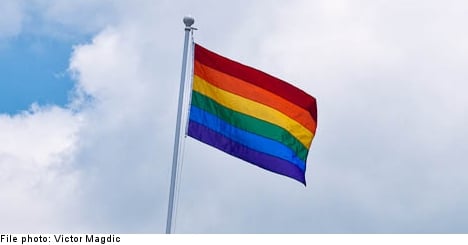“I have received a letter, on headed notepaper from someone who says he is a lawyer of the court stating that if our organization does not desist in supporting the marriage then they will proceed with legal procedures that could result in lifetime imprisonment,” said Ulrika Westerlund to The Local.
The Local reported on Monday that the person, who is legally defined as a man but identifies as transgender, is the target of a petition placed before the Sindh High Court in Karachi, Pakistan, calling for prosecution following the marriage to his same-sex partner in Sweden in late 2013.
Same-sex couples were given equal rights to marriage in Sweden in May 2009 and since then more than 2,000 people have taken the chance to get married with many more converting their legal status from registered partnership to married.
RFSL is assisting the person in their bid for asylum on the grounds of sexuality and Westerlund told The Local that the threats directed against them strengthen the case.
“The Migration Board can’t very well turn around and say that they are not threatened after this,” she said.
The Swedish Aliens Act was amended in 2005 to include sexual preference and gender as grounds for asylum. A risk assessment is made as to whether the asylum-seeker faces a risk of persecution due to their sexual preference, gender, or gender identity in their home country.
Westerlund argued that there are deficiencies in how the law is interpreted and argued that this risk assessment can create a certain Catch-22 situation for many LGBT refugees due to, among other things, the reasoning from migration authorities of the need for having manifested their sexual preference publicly.
“Applicants could be asked whether they had lived openly as homosexuals, in say Sudan. When they answer ‘no, I would have been killed’ it can be interpreted that they had not then exposed themselves to risk and be denied asylum,” she explained.
“There is a lack of knowledge among migration authorities about the lives of LGBT people, but there also seem to be some absurdities in the law. It needs to be revised.”
Oscar Ek at the Migration Board told The Local that a clear framework is followed for assessing all asylum cases, including those motivated by sexual preference.
“The law is clear that a homosexual should not be forced to live in secret, as many do in many parts of the world. We aim to achieve the best results possible,” he said.
Ek added that some 20 staff have recently completed specialist training in LGBT issues and have since May been deployed at Migration Board offices across the country.
“I would say the jury is still out on that one,” he said, conceding that there is more that can be done with regards to training staff.
“We need to increase knowledge about the hetero-normative society. It can resemble something of a dead end on the issue of how a relationship can be.”
He told The Local that there are no figures for how many people seek asylum on the grounds of sexual preference, gender, or gender identity as the Swedish constitution prevents tracking such information.
Same-sex marriage is permitted in 15 countries with several others considering bills or allowing same-sex marriage in some jurisdictions.
Homosexuality is criminalized in some 80 countries across the world and in at least six countries the punishment can extend to the death penalty for homosexual acts.
Peter Vinthagen Simpson


 Please whitelist us to continue reading.
Please whitelist us to continue reading.
Member comments